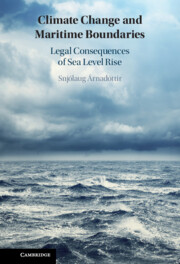Book contents
- Climate Change and Maritime Boundaries
- Climate Change and Maritime Boundaries
- Copyright page
- Contents
- Acknowledgements
- Table of Cases
- Table of Treaties and Legislation
- Abbreviations
- Introduction
- 1 Law of the Sea and the Changing Marine Environment
- 2 Unilaterally Declared Maritime Limits
- 3 Maritime Delimitation and Coastal Instability
- 4 Maritime Delimitation and the Marine Environment
- 5 Fundamental Change of Circumstances
- Conclusion
- Bibliography
- Index
1 - Law of the Sea and the Changing Marine Environment
Published online by Cambridge University Press: 02 December 2021
- Climate Change and Maritime Boundaries
- Climate Change and Maritime Boundaries
- Copyright page
- Contents
- Acknowledgements
- Table of Cases
- Table of Treaties and Legislation
- Abbreviations
- Introduction
- 1 Law of the Sea and the Changing Marine Environment
- 2 Unilaterally Declared Maritime Limits
- 3 Maritime Delimitation and Coastal Instability
- 4 Maritime Delimitation and the Marine Environment
- 5 Fundamental Change of Circumstances
- Conclusion
- Bibliography
- Index
Summary
The international law of the sea is premised on the fact that maritime entitlements are generated by the coast. This is rooted in the assumption that territory is permanent and, consequently, a relatively stable basis for the division of jurisdictional zones at sea. However, sea level rise and coastal erosion are currently tearing at the foundation of all maritime entitlements, in ways that were not anticipated by the United Nations Convention on the Law of the Sea.
Sea levels are rising and they will continue to rise, by several metres if the ice sheets in Greenland and Antarctica become unstable. Ocean warming and acidification are increasing; threatening marine ecosystems and leading to loss of biodiversity. Extreme weather events, floods, hurricanes and extreme waves are becoming frequent in most parts of the world. These changes will affect the living conditions of at least 300 million people by 2050. They will also affect marine ecosystems, islands, rocks, shoals, reefs and the maritime entitlements they generate. The consequences will be particularly severe for low-lying island States and some of them may cease to exist when they lose all habitable territory.
Keywords
- Type
- Chapter
- Information
- Climate Change and Maritime BoundariesLegal Consequences of Sea Level Rise, pp. 3 - 12Publisher: Cambridge University PressPrint publication year: 2021

